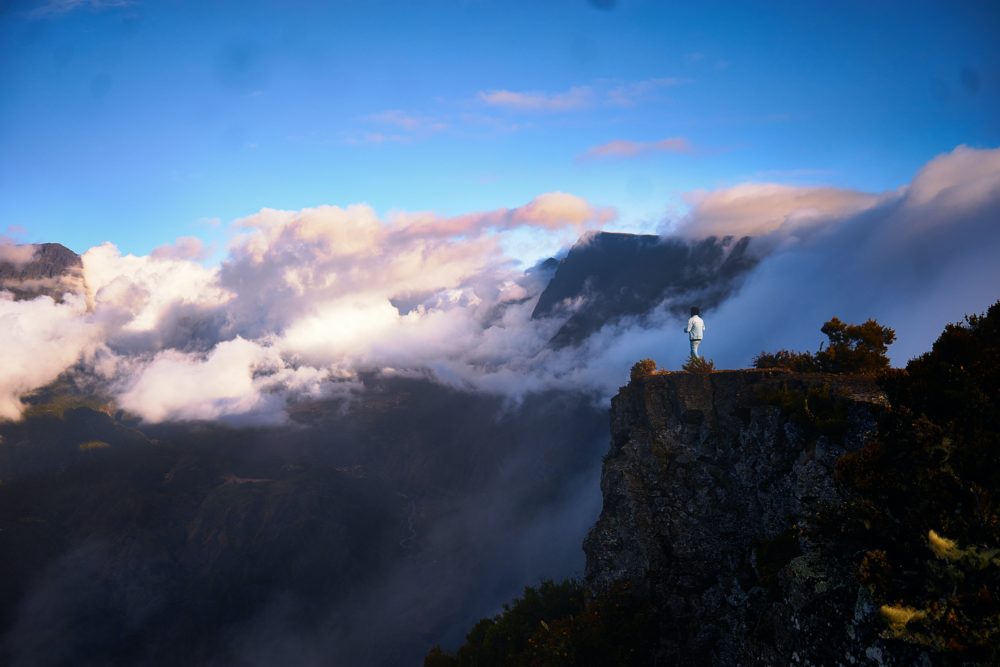Perhaps because my first big writing project gave me room to articulate my sexual longings, come out bisexual, and figure out the implications for my Christian faith; perhaps because I’m drawn to spiritual and therefore intimate subjects, my first drafts (and often second and third) I tend to write for no one but me. Of course this blog is an exception; I’m very much thinking of you, dear reader! The middle grade novel I’m plugging away at is for my daughter and my books on craft are for writers, so I’m well aware of when and how readers influence my solitary time at the writing desk. Frequently, however, I move from my journal to a project notebook to the computer, preserving what I call my “cloud of privacy and unknowing.” I think of it as a psychic space where I can inhabit completely the mystery of what’s emerging, without concern for others.
With practice the boundaries around this space have strengthened. I’m more fearless, probing, truthful, experimental. The pressure to produce has diminished, and my patience for each project’s slow evolution has increased. Sure, I’m just as committed to the literary art, but now in service of my subject and my heart’s curiosity rather than any reader. I’ve had fun. I’m writing better than ever. I’m producing pieces that are less and less publishable—too risky, too Christian, too interior—but also care less when they don’t make it into readers’ hands. Some I choose never to send out.
I borrow the “cloud of unknowing” metaphor from an anonymous 14th century mystic who used it to describe silent prayer. If you substitute his masculine God language with “audience” or, as I do, a sense of union with the Other, he accurately describes my experience of writing:
When you first begin, you find only darkness, and as it were a cloud of unknowing. You don’t know what this means except that in your will you feel a simple steadfast intention reaching out towards God. Do what you will, this darkness and this cloud remain between you and God, and stop you both from seeing him in the clear light of rational understanding, and from experiencing his loving sweetness in your affection. Reconcile yourself to wait in this darkness as long as is necessary, but still go on longing after him whom you love. For if you are to feel him or to see him in this life, it must always be in this cloud, in this darkness. And if you will work hard at what I tell you, I believe that through God’s mercy you will achieve this very thing.
About ten years ago, I was so blown open by a dream and unsettled by what was transpired afterward in prayer that I began an essay. Narrative essays, with their cadence and thrust, their capacious generosity, I knew could usher me into the fiery core of my questions. For years I shared this project with no one, not even my trusty writing group. It was too secret, too embarrassing, too Christian. When I realized I was withholding this dimension of my prayer life from my spiritual director (because the process itself was as much prayer as the meditation I was describing), I let him read it. Four years ago I finished. At 8000 words, with quotes from the Bible and theologians and my contemplative teachers, I assumed it was unpublishable and tucked it away. Other than my spiritual director, no one laid eyes on it.
In the intervening years I’ve grown into the essay’s insights. The boldness gleaned in that cloud of privacy has spilled into my teaching, my friendships. What once felt embarrassing is now a truth I share frequently. So when I saw Orison Press’s chapbook contest, I submitted the essay.
And won. Now I’m reeling with wonder that anyone, friends and strangers, might join me between the stapled pages inside my sweet cloud. It’s dark there and aches for that which we most love. Time is so slow or fast we can’t sense its passage. We know nothing, feel nothing, are struck dumb, and nonetheless, unfathomably, are bathed in mercy. What else can I do but bow down in gratitude?
– Elizabeth Jarrett Andrew
PS: Read more about this award & see upcoming offerings and events here!
Photo by Yoann Boyer on Unsplash
